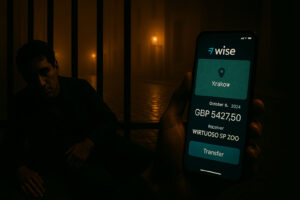There are many things a support team should never say to a victim of crime.
At the top of that list? “Go back to where it happened and ask for your money back.”
That’s what Wise told me.
Multiple times.

I had just explained that I had been drugged, extorted, and left half-naked on the floor of a back room in a shady bar, and was found in a park in Krakow. I sent them screenshots from local news blogs warning tourists of the exact address — reports of roofies, theft, and even dismemberment.
I told them the name was different, but the location was the same, the same name used for the wire transfers.. I sent the police report. I made it as clear as humanly possible:
“That venue is not safe. They nearly killed me. I will not be going back.”
And yet, I received multiple responses from Wise representatives suggesting I should try to contact the venue directly, or visit in person to ask for my money back.
Let that sink in.
A customer, reporting a violent crime, is told to re-enter the scene of that crime.
The message couldn’t be clearer: Wise either didn’t read the information I sent — or worse, they read it and didn’t care.

If you’ve ever wondered what institutional failure looks like in fintech, this is it.
Support systems built to protect you should never put you at risk. And when they do — they’re no longer support. They’re part of the problem.
This wasn’t a misunderstanding. It was negligence. It was dangerous. And it was deeply personal.
This isn’t just about lost money anymore. This is about a company choosing policy over human life.
This is documented in multiple sources, including:
-
November 12th Email
Referenced as:“November 12th (saying I should contact the criminals)”Detailed Case Documenta….
-
Multiple documented summaries
“On multiple occasions, they suggested I contact or return to the location where I was held captive and extorted. This is an absurd and reckless suggestion.”Detailed Case Documenta….
-
Chat Transcript, Oct 7
A Wise agent said:“In the future, if you got charged by a merchant you were not supposed to be charged by, I can advise you to contact the merchant directly and ask them why you were charged.”FIG 10 _ email transcri….
This language clearly shows their failure to escalate appropriately, and how their standard protocol — even after you reported trauma and a police case — dangerously pushed you to reengage with the location of the crime.








Add comment